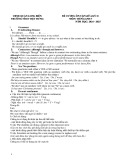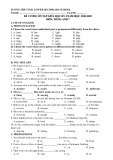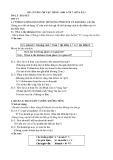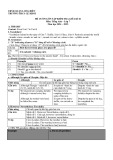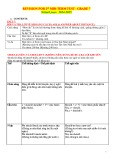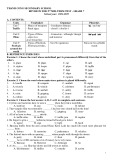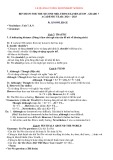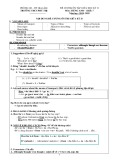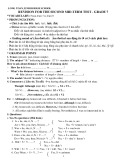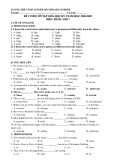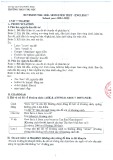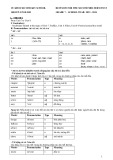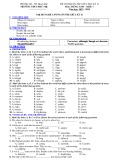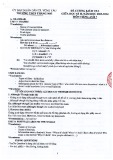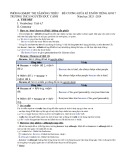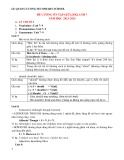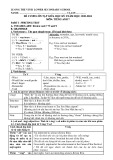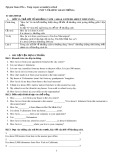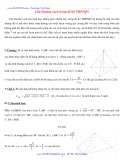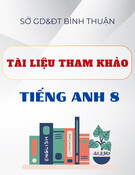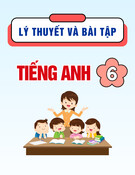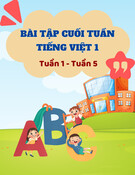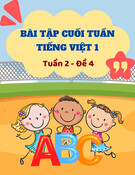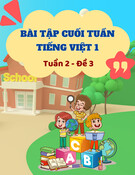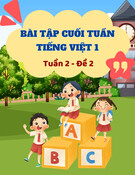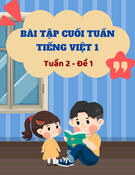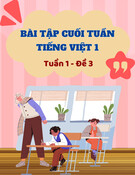Nguyen Xuan Tho – Vong xuyen secondary school
UNIT 7: TRAFFIC (GIAO THÔNG)
B. GRAMMAR
Ả Ờ Ề
I. H I VÀ TR L I V KHO NG CÁCH ( ASK & ANSWER ABOUT DISTANCE) ượ
ể ỏ ề ườ ả ỏ ườ Ỏ Cách dùng c dùng đ h i v kho ng cách, quãng đ ị ữ ng gi a 2 đ a ng đ
ể ủ ữ ề ả ấ C u trúc ả
Ví dụ ừ ấ ả nhà b n t ơ i sân bay Tân S n Nh t bao xa?) ạ ớ ả ườ ả ừ L u ýư ả ng dùng “about” (kho ng ch ng) khi không bi ế t i v kho ng cách ta th ả ả ờ ề ề Ả “How far” là câu h i th đi m.ể ặ Ta đ t “It” làm ch ng trong câu đ nói v kho ng cách. How far is it from A to B? It is (about) + kho ng cách How far is it from your house to Tan Son Nhat airport? (Kho ng cách t It’s about 200 km (Kho ng 200 km) Trong câu tr l chính xác v kho ng cách đó.
Ụ Ậ
BÀI T P V N D NG C B N:
Ơ Ả Ậ Bài 1: Khoanh tròn vào đáp án đúng.
1. How far is it from your apartment (from/to) the city centre? 2.
3.
It is (at/ about) 1 kilometre. It is not very (near/far) from my house to the post office. It is just 500 metres.
4. How far (is it/ it is) from your country to Japan? 5. How (far/ much) is it from your location to the train station? 6. My house is 2 kilometers (near/ far) from my grandparents’ bungalow. 7. How far (is it/ are they) from here to the local museum? 8.
I think it is about 200 ( metres/ metre) from here to the nearest bus stop. 9. My school is not far (from/to) my house. I can walk to school every day. 10. How far is it (from/ at) your office to the supermarket? ợ ỗ ố ộ ừ thích h p vào ch tr ng. ề Bài 2: Đi n m t t
1. How_______ is it from your house to the city centre? 2. How far is it from this restaurant to the nearest __________? It is about 1 kilometer from this restaurant to
the nearest bank?
3. How far__________it from Hanoi to Ho Chi Minh City? 4. It is about 5 kilometres from my house__________yours. 5. How far is_________from your company to your apartment? 6.
It is __________3 kilometres.
7. How far is it from my school to yours? __________is about 8 kilometres 8. How far is it __________where you live to your company?
ự ữ ướ ả ờ ỏ ề ế ả i cho tr c, hãy vi t câu h i v kho ng cách.
Bài 3: D a vào nh ng câu tr l 1. ______________________________________________________________? It is about 300 metres from here to the nearest post office. 2. ______________________________________________________________? It is about 3,900 kilometers from New York to California. 3. ______________________________________________________________?
1
ữ ỗ ả ờ ướ ữ ấ ấ c nh ng câu có l ử i sai và s a i đúng. Đánh d u (X) tr c nh ng câu tr l
i cho đúng.
Nguyen Xuan Tho – Vong xuyen secondary school It is about 200 metres from my house to my family store. 4. ______________________________________________________________? It is about 4576.89 miles from Beijing to Berlin. 5. ______________________________________________________________? It is about 1 kilometer from my hotel to the beach. 6. ______________________________________________________________? It is about 500 metres from here to the place where I live. 7. ______________________________________________________________? It is about 200 kilometers from his hometown to the place where he lives now. 8. ______________________________________________________________? It is just 200 metres from the park to the parking lot. 9. ______________________________________________________________? It is approximately 4 kilometers from here to the airport. 10. ______________________________________________________________? It is about 60 kilometers from my parent’s house to mine ướ Bài 4: Đánh d u (√ ) tr ạ l ________ _
________ _
________ _
It is not far from my university to yours ________ _
________ _
________ _
Its not far from our school to the camp site. ________ _
________ _
1. How far is from your house to the nearest restaurant? __________________________________________________________ 2. It is at 2 kilometers from my house to La Villa French restaurant. __________________________________________________________ 3. How far is it from your university and my university? __________________________________________________________ 4. __________________________________________________________ 5. How far is it from here to our destination? __________________________________________________________ 6. How far it is from our school to the camp site? __________________________________________________________ 7. __________________________________________________________ 8. How far is it at the train station to the nearest drugstore? __________________________________________________________
ặ ả ờ ỏ ề ả ẵ ợ ự i các câu h i v kho ng cách sau đây:
Bài 5: D a vào g i ý cho s n trong ngo c, tr l 1. How far is it from your house to the gym? (300 metres) __________________________________________________________ 2. How far is it from where you live to where you work? (2 kilometres) __________________________________________________________ 3. How far is it from Hanoi to Hoi An? (about 800 kilometres) __________________________________________________________ 4. How far is it from from Earth to Mars? (about 34 miles) __________________________________________________________ 5. How far is it from Earth to the nearest star? (4.2 lightyears) __________________________________________________________
2
Nguyen Xuan Tho – Vong xuyen secondary school 6. How far is it from North Pole to Equator? (about 100000 kilometres) __________________________________________________________
ượ ữ ạ II. THÓI QUEN TRONG QUÁ KH V I “ USED TO” Cách dùng Ứ Ớ ể c dùng đ miêu t ứ ế ả ng xuyên trong quá kh và đã k t thúc, không còn ộ ả ặ nh ng thói quen, hành đ ng ho c tr ng thái đã x y ở ệ ạ hi n t i. ấ C u trúc
ướ Ví dụ ng đi b i cùng nhau) ơ ướ ướ ạ ưỡ “used to” đ ườ ra th (+) S+ used to + V () S+ didn’t use to + V (+) Did + S+ use to + V? I used to listen to the radio. (Ngày tr c tôi th They used to go swimming together. (Ngày tr He didn’t use to play marbles. (Ngày tr Did you use to ride a buffalo? (Ngày tr ườ ng nghe đài) ướ ọ ườ ơ c h th ấ c anh y không ch i bi) c b n có đi c i trâu không)
Ơ Ả Ụ Ậ Ậ
BÀI T P V N D NG C B N:
Bài 6: Khoanh tròn vào đáp án đúng. 1.
I (used to/ use to) collect stamps when I was nine years old. 2. My father (used to/ use to) be an excellent student at university. 3.
I didn’t (used to/ use to) eat with chopsticks when I lived in America. 4. Did they (used to/ use to) work in a big factory before their retirement? 5. Peter (used to/ use to) drive to work but now he doesn’t. 6. My younger brother didn’t use (walk/ to walk) to school 7. My classmates didn’t (used to/ use to) like me. 8. There (used to/ use to) be a lot of trees along this street. 9. Horse and cart used to (be/is) the main way of transportation. 10. Coffee didn’t (used to/ use to) be my favorite drink. 11. Did Sarah (used to/ use to) be Mr Vu’s student? 12. My grandmother (used to travel/ use to travel) a lot before she got married. 13. Mr Ha(used to/ use to) work in Japan for 3 years. 14. I didn’t (like used to/ use to like) reading books. 15. Did Jim and Jane (used to/ use to) hate each other?
ấ ạ ộ ớ ử ụ ặ ể trong ngo c đ hoàn thành đo n văn sau:
ừ Bài 7: S d ng c u trúc “ used to V” v i các đ ng t Travelling (1. not be)__________as quick and convenient as we see today. In the ancient world, people (2. travel)__________long distances just on foot. It (3. take)__________a lot of time for people to travel from place to place. As time when by, they knew to domesticate animals and use them for transportation. People (4. ride)__________horses, donkeys and camels instead of walking. Horse and cart (5. be)__________ one of the main means of transportation and the cart (6. be)__________common worldwide before the Industrial Revolution. During the Industrial Revolution, many inventions were introduced. Modern rail transport systems (7. make)__________use of steam engine. The systems (8. be)__________the first practical form of mechanize land transport. In the past, roads (9. be)__________ narrow and there (10. be)__________vey few cars in the streets. People (11.not find)__________it easy to travel long distance because it (12.take)__________much time and money for transportation. However, today travelling is so easy and cheap thanks to the advancement of technology.
3
ừ ặ ể ử ụ ớ trong ngo c đ hoàn thành câu. S d ng th ể ử ụ ị ấ ủ ị ợ ẳ ấ
Nguyen Xuan Tho – Vong xuyen secondary school ộ Bài 8: S d ng c u trúc “ used to V” v i các đ ng t kh ng đ nh, ph đ nh và nghi v n sao cho h p lý. 1.
I (go)______________to work by bus but now I drive my car to work.
2. Joe and I (like)______________each other but now we are friends. 3. Sue (fancy)______________rock music but now she is a fan of it. 4. My uncle (work)______________as a police officer before he retired. 5. ______________(you/ catch)fireflies when you were a child? 6.
I (play)______________tennis with my friends but now I am too busy to continue.
7. My father (smoke)______________ a lot but he gave up three years ago. 8. My brother (do)______________the washing but now he wants to help my mon do it 9. Jane (break)______________ the speed limit and a police officer stopped her. 10. The Smiths (live)______________in the country but now they live and work in the city. 11. This doctor (be)______________famous but now everyone knows him. 12. My hometown (have)______________ an amusement park but the authorities have opened one. 13. My student (be)______________ very bad at Math but now he improves a lot. 14. Jim’s brother (like)______________ reading comic but he stopped reading it 1 year ago. 15. His parents (live)______________in a small house but now they live in a big one.
TEST 1 UNIT 7
I.
Find the word which has different sound in the underlined part.
1. A. rest 2. A. traffic 3. A. sign 4. A. nearest 5. A. railway C. garden C. plane C. triangle C. bread C. sail D. identify D. station D. drive D. health D. captain
II.
B. help B. pavement B. mistake B. head B. mail Choose the correct answer by circling A, B, C or D. 1. Linda used to A. did C. doing D. do
morning exercise when she got up early. B. does the bus to work every day, but I cycle. B. drives 2. My mum A. catches D. runs the road. C. goes 3. You should look right and left when you go C. up B. across A. down D. along 4. Bus is the main public in Viet Nam. A.travel B. tricycle C. transport D. vehicle 5. The play was so boring. , An saw it from beginning to end. A. Therefore B. Despite C. However D. Although 6. She’s sure that they will find the film . D. entertained 7. B. entertain
C. entertainment ” B. Sure. What film shall we see? D. I’m sorry, I can’t. 8. C. Although B. Despite D. Nevertheless 9. D. Which C. When of that singer. 10. My father liked the A. entertaining “Do you like seeing a film?” “ A. No, I don’t like it at all C. Who is in it? being frightened by the images, Lan still liked the film so much. A. In spite is La Tomatina celebrated? Every August. B. Why A. Where B. performer C. performance A. perform D. performing
4
Nguyen Xuan Tho – Vong xuyen secondary school
down on the way to school? 11. Does your bike ever B. take A. break D. turn C. do 12. I go on foot when I was in primary school. B. break C. can D. may A. used to 13. Give a before you turn left or right. A. sign B. turn D. signal 14. A lot of dancers go to Rio de Janeiro to the Carnival. A. attend B. join C. sound C. perform D. appear 15. the film was gripping, Tom slept from beginning to end. C. However B. Despite D. Although
III.
A. Therefore Choose the correct option for each gap in the sentences. 1. Drivers have to their seatbelt whenever they drive. A. put B. tie C. fasten D. put on 2. We should wait for the traffic lights before we cross the street. A. turn green B. to turn green C. turn yellow D. to turn yellow 3. All of us have to obey strictly. A. traffic rules B. traffic C. traffic jam D. regular 4. Cyclists and motorists have to wear a when they ride a motorbike. A. hard hat D. helmet 5. He forgot to give a B. cap B. sign C. mask before he turned left and got a ticket. C. light D. hand 6. D. How many B. How much C. How long a bus station in the city centre, but it has been moved to the suburbs. B. used to have C. use to have D. were 8. A. signal does it take you to get to Ho Chi Minh City by plane? About 2 hours. A. How far 7. There A. used to be I marbles when I was young, but now I didn’t. A. play B. used to play C. have played D. didn’t use to play 9. “ is it from your house to the nearest bus stop?” “About 50 meters’ C. How often D. How much A. How far 10. We should A. walk B. How long the street at the zebra crossing. B. walk on C. walk through D. walk across 11. Lan used to go to school . A. with bicycle B. by foot C. in car D. by bus 12. Public in my town is good and cheap. A. transport B. tour C. journey D. travel 13. _______ is not very far from here to the city center. A. That B. This C. It D. There 14. When there is a traffic jam, it me a very long time to go home. A. costs B. takes C. lasts D. spends 15. Mai’s dad usually drives her to school her school is very far from her house. A. but B. though C. because D. or 16. Yesterday Hoa and Lan round West Lake. It took them an hour. A. cycle C. cycling D. cycled 17. Minh used to A. does C. doing D. did
C. obey D. remember 18. If people A. follow 19. You should A. see C. be D. take the last bus home. B. cycles his homework late in the evening. B. do the rules, there are no more accidents. B. take care of right and left when you go across the roads. B. look 20. Hurry up or we can’t B. follow A. keep D. catch
C. go 5
Nguyen Xuan Tho – Vong xuyen secondary school IV.
Complete the sentences with the correct form of “used to” and the verb in bracket.
(not/ be) as cold as they are now.
(you/ enjoy) maths at school? (not like) flying, but I love it now. (be) friends, but we don’t get on now. (John/ work) for IBM before he came here? (live) with her mother, but now she lives with her father.
1. 2. I 3. We 4. 5. Winters 6. She 7. I 8. (he/ play) for Manchester United?
(not do) any exercise. V. Write sentences with “it”. Use these cues. 1. 120 km/ Ho Chi Minh City/ Vung Tau .......................................................................................................................................... 2. 384,400 km/ the Earth/ the Moon .......................................................................................................................................... 3. not very far/ Ha Noi/ Noi Bai Airport .......................................................................................................................................... 4. 500 meters/ my house/ nearest shop .......................................................................................................................................... 5. 700 meters/ my house/ Youth Club
6.
VI.
.......................................................................................................................................... five km/ my home village/ nearest town .......................................................................................................................................... Read the passage and fill in the blanks with suitable words. Who are the (1)
drivers? Which drivers are the safest on the roads? According to a recent survey, are the most likely to have an accident. Older drivers are more (3)
faster cars with bigger interesting facts in the survey is that passengers have an effect on the friends in the car, their driving become worse. When their wife or , their driving is better. But opposite is true for women. Their driving is dangerous when their husband or boyfriend is in the car. young and inexperienced (2) . Young men have the worst accident records of all. They often (4) engines. One of the (5) driver. When men have (6) girlfriend is in the car, (7) (8) VII.
the bus you want. You can take a taxi, but it is (7) expensive than
Read the following text carefully and choose the correct answer A, B, C or D for each of the gap. When you are in Singapore, you can go about (1) taxi, by bus, or by underground. I myself prefer the it is fast, easy and cheap. There are (3) buses and taxis in Singapore and underground (2) one cannot drive along the road (4) and without many stops, especially on Monday morning. The underground is therefore usually quicker (5) taxis or buses. If you do not know Singapore very well, it is the difficult (6) underground or a bus. On the underground, you find good maps that (8) you the names of the stations and show you (9)
1. A. by 2. A. but 3. A. few 4. A. quick 5. A. so 6. A. find 7. A. less 8. A. tell 9. A. who 10. A. how to get to them, so (10) it is easy to find your way. D. on D. so D. some D. quickest D. as D. found D. much D. telling D. how D. where B. in B. because B. a lot B. quickly B. like B. to find B. more B. told B. what B. that C. at C. when C. many C. quicker C. than C. finding C. most C. tells C. when C. when
VIII.
Read the text and fill in the blanks with correct words. Use the words in the box.
6
Nguyen Xuan Tho – Vong xuyen secondary school
the traffic. Taxis are bringing tired people (2) The streets are crowded (1)
a few hours before their busy day in bringing fresh fruits and vegetables into the city. Ships are bringing food
the morning, the streets are filled again with people. Millions of people in the big city, and millions of people who work in the big city live in the suburbs, the commuters, are offices. Everyone is in a hurry. Some stop only to drink a cup of coffee. Others to have breakfast. the airport and the train stations to the hotels. They hope to (3) the big city. Trucks (4) fuel to the harbour. (5) By seven o’clock (6) (7) hurrying to get to (8) stop to buy the morning paper (9) The noise of traffic (10) louder. The policemen blow their whistles to stop the traffic or to hurry it
along. IX. Read the text and then choose the best answer A, B, C or D.
Yesterday, on the way home from school, I saw an accident. A boy was run over by a taxi when he was riding his bicycle. The boy’s leg was broken and it was bleeding badly. Someone there tried to stop the bleeding. They put pressure on it and held it tight. A man used his mobile phone to call the emergency service. Some minutes later, an ambulance arrived and sent the boy to the hospital. Two policemen came to the scene immediately. Some people told the police that the taxi driver was driving at a very high speed when the accident happened. Some others began talking about the traffic accidents these days and blamed the increasing number of accidents on the roads for careless driving and drunk drivers. 1. What did the writer see yesterday? B. A fire A. An accident D. A crash
A. a bus B. a bicycle D. motorbike
A. a police B. a car D. an ambulance 4. What part of his body was hurt? – His C. A fighting 2. The accident happened between a taxi and . C. a car . 3. The boy was sent to the hospital by C. a passenger . C. leg A. arm B. head
D. shoulder . 5. How was the driver driving when the accident happened? – Very D. well C. carefully B. slowly
X.
1. A. fast Put the words and phrases in the right order to make meaningful sentences. takes/ art/ half/ gallery/ only/ hour/ to/ an/ the/ It/ to/ get. .......................................................................................................................................... 2. mine/ book/ Her/ from/ is/ different. .......................................................................................................................................... 3. playing/ young/ brother/ the/ very/ piano/ My/ when/ was/ enjoyed/ he. .......................................................................................................................................... 4. are/ I/ as/ as/ not/ thought/ These/ expensive/ clothes. .......................................................................................................................................... 5. new/ is/ next/ A/ to be/ going/ school/ built/ year/ here. ..........................................................................................................................................
XI. Rewrite the following sentences in the way that their original meanings do not change.
1. Van Cao composed Viet Nam's anthem Tien Quan Ca. → Viet Nam’s anthem Tien Quan Ca .............................................................................. 2. Be careful or you’ll hurt yourself. → If you are ..................................................................................................................... 3. What is the price of the bicycle? → How much .................................................................................................................? 4. The market does not have any carrots → There ........................................................................................................................... 5. You’re the best guitarist in the school. → No one .........................................................................................................................
7
Nguyen Xuan Tho – Vong xuyen secondary school XII.
Rewrite each sentence or question so it has the same meaning. Use “Used to”.
Ex: I was in the school tennis team. → I used to be in the school tennis team. 1. Anna had long hair when she was at school. ............................................................................................................ 2. Mary didn’t listen when her teachers were speaking. ............................................................................................................ 3. Ricardo got up at 6.00 when he was training for the Olympics. ............................................................................................................ 4. What did you usually do on Saturday evenings? ............................................................................................................ 5. Sophie was afraid of dogs when she was a little girl. ............................................................................................................ 6. We always gave our teachers presents at the end of term. ............................................................................................................ 7. Did you live next door to Mrs. Harrison? ............................................................................................................ 8. My brother wore glasses when he was young.
XIII.
............................................................................................................ Choose the sentence that has the same meaning as the first. 1. As soon as I receive my result, I will phone you.
A. I will ring you the moment I receive my result. B. Sooner or later after I receive my result, I will give you a ring. C. After receiving my result, I will call you. D. I will make a phone call to you when I get my result. 2. When I was a young girl, chocolate was one of my favourites.
3.
4.
5.
B. He might be met at the airport. D. He may be met at the airport.
XIV.
1. A. When very young, I like eating chocolate cakes. B. Chocolate used to be a favorite of mine when I was a young girl. C. My favourite was chocolate as was a little girl. D. Being a little girl, I like chocolate. I haven’t seen my aunt for years. A. I haven’t meet my aunt for long ago. B. The last time I met my aunt was since years ago. C. I last saw my aunt years ago. D. I didn’t see my aunt years ago. I think it’s necessary to tell Tim about it at once. A. Tim may be told about it at once. B. Tim might be told about it at once. C. Tim must be told about it at once. D. Tim should be told about it at once. It is essential that we meet him at the airport. A. He must be met at the airport. C. He should be met at the airport. Complete the second sentences so that it has a similar meaning to the first. I usually stayed up late to watch football matches last year, but now I don’t. → I used ............................................................................................................................ 2. There were some trees in the field, but now there aren’t any. → There used .................................................................................................................... 3. Anna doesn’t live with her parents any more. → Anna used ....................................................................................................................
8
Nguyen Xuan Tho – Vong xuyen secondary school
4. He is not a poor man any more, but he become a rich businessman. → He used ........................................................................................................................ 5. They didn’t often go to the cinema every Sunday last year. → They didn’t use ............................................................................................................ 6. My hair now is much longer than that in the past. In the past my hair used ............................................................................................... 7. → I don’t have time to collect stamps as when I was in primary school. → ............................................................................................................................ I used 8. Did you often go to the beach when you lived in Nha Trang? → Did you use .................................................................................................................. 9. Mr. Hung often went to work by motorbike, but now he goes to work by bus. → Mr. Hung ..................................................................................................................... 10. There were traffic jams in this street during rush hours, but now the street become wider. → There ............................................................................................................................
UNIT 8: FILMS ( PHIM NH)Ả
Ừ Ả Ả
ừ ậ Ving/ Ved
B. GRAMMAR. TÍNH T VING/ VED MIÊU T PHIM VÀ C M XÚC KHI XEM PHIM (ED AND –ING ADJECTIVES. 1. Cách thành l p tính t ừ Cách thành l p tính t Ví dụ ậ ừ ộ ộ ừ t
ớ ấ ễ ưở ộ ọ ng)
ấ ạ ộ
ủ ọ ạ ạ ấ ớ I’m interested in sciencefiction films. ( Tôi r t thích thú v i các b phim khoa h c vi n t I was so moved when I watched the end of the film. ố ủ ộ (Tôi đã r t xúc đ ng khi tôi xem đo n cu i c a b phim) I was really surprised at the achievement at the Cannes Film Festival. ( Tôi đã r t ng c nhiên v i thành tích c a h t i Liên hoan phim Cannes) ả i.ườ
ố ộ ộ ấ ọ khoa h c vi n t ị ng r t thú v )
ộ ộ ủ ộ ậ ả ế
ế ọ ừ ượ ạ ạ i Liên hoan phim Cannes) Last night, I saw an interesting sciencefiction film. ễ ưở (T i qua, tôi xem m t b phim The end of the film was so moving. ộ (K t thúc c a b phim th t c m đ ng) They have got a surprising achievement at the Cannes Film Festival. c thành tích đáng ng c nhiên t (H v a giành đ m t đ ng t Thêm “ed” vào sau ộ ừ ể ạ đ t o ra đ ng t ả ừ ộ miêu t đ ng t ai đó ế ư ấ ả c m th y nh th ộ ủ nào, c m xúc c a m t ng Thêm “ing” vào sau ừ ể ạ đ t o ra đ ng t ả ừ miêu t đ ng t ai, cái ạ ả i c m giác gì mang l ố ư nh th nào cho đ i ngượ t
ộ ặ 2. M t vài c p tính t
ừ ổ ế ph bi n: edừ Tính t Tính t ingừ
ượ ấ ng ngùng)
ấ ọ ấ ọ
ẽ Entertained (thú v )ị ị ố ố Embarrassed (b b i r i, ng ị ự Annoyed (b b c mình) Interested (thích thú) Disappointed (th t v ng) Excited (sôi n i)ổ ệ ứ Exhausted (ki t s c) ờ ấ Surprised (b t ng ) ố ố Confused (b i r i) ả ợ Frightened (ho ng s ) ẻ ẽ ạ Bored (nh t nh o, t ạ nh t)
Entertaining (làm thú v )ị ổ ố ố Embarrassing (làm b i r i, x u h ) ự Annoying (làm b c mình) Interesting (làm thú v )ị Disappointing (làm th t v ng) Exciting (làm sôi n i)ổ ệ ứ Exhausting (làm ki t s c) ờ ấ Surprising (làm b t ng ) ố ố Confusing (làm b i r i) ả ợ Frightening ( làm ho ng s ) ạ Boring (làm cho nh t nh o) 9
Nguyen Xuan Tho – Vong xuyen secondary school
Ậ Ụ
BÀI T P V N D NG C B N ừ
ừ ừ ữ ộ ừ BÀI 1: Thành l p tính t Ơ Ả Ậ đuôi “ed” và tính t đuôi “ing” t nh ng đ ng t sau:
ậ V ed ing
annoy bore confuse depress disappoint embarrass excite exhaust fascinate frighten interest move relax satisfy shock surprise terrify thrill tire
ướ ừ ặ ẵ ữ ớ i đây v i tính t đuôi “ed” ho c “ing” cho s n.
Bài 2: Hoàn thành nh ng câu d 1. moved/ moving The film was so_______________ I was deeply _______________ by the film. 2. terrified/ terrifying
Both of us were _______________ of that violent scene. That violent scene was _______________. 3. tired/ tiring
Going shopping all day makes me feel_______________. Going shopping all day is _______________. 4. interested/ interesting
Jim’s _______________ in reading books. Jim finds reading books_______________. 5. fascinated/ fascinating
Jane sometimes has many _______________ ideas. We are _______________ by Jane’s ideas. 6. depressed/ depressing
The weather was _______________ yesterday. The weather made me fell _______________yesterday. 7. annoyed/ annoying
His tone of voice is so _______________ I am so _______________ by his tone of voice. 8. shocked/ shocking His latest news was _______________.
10
Nguyen Xuan Tho – Vong xuyen secondary school We were _______________ at his latest news.
Bài 3: Khoanh tròn vào đáp án đúng.
1. Are you (interested/ interesting) in classical music? 2.
I always feel (exhausted/ exhausting) after long working hours.
3. The movie I saw last night was (excited/ exciting). 4.
I find it (astonished/astonishing) you didn’t like scifi movies.
5. My sister easily gets (embarrassed/ embarrassing). 6. Tom, you look (tired/ tiring). What have you done? 7.
I think all my teachers are (amazed/ amazing). I love them very much.
8. Last week, my father threw a (surprised/ surprising) party to celebrate my birthday. 9.
I didn’t find the jokes at all (amused/ amusing).
10. Last year, I had a really (terrified/ terrifying) experience at the camp site. 11. I never find reading books (bored/ boring). 12. His wife looked (astounded/astouding) at the news. 13. Ann was (thrilled/ thrilling) to bits that she got the job. 14. This complicated system really makes me (confusing/confused). 15. The film was terribly (disappointed/ disappointing).
ừ ạ ặ ừ ữ ộ ừ đuôi “ed” ho c “ing” t o thành t nh ng đ ng t ặ ể trong ngo c đ hoàn thành ướ ữ ử ụ Bài 4: S d ng tính t i đây. nh ng câu d
1. The kitchen was in a_______________ state when she left. ( disgust) 2. Jim had an accident yesterday and his situation is _______________. (worry) 3. The result of her exam is very _______________. ( disappoint) 4. This is the most_______________ film I have known. (thrill) 5. Everyone was _______________ at her new hair. (surprise) 6.
I really got _______________ at the lack of progress. (frustrate) 7. What is the most _______________ creature in the world? (frighten) 8. It is absolutely a visually _______________ movie. (stun)
9. Jane gave up her parttime job because it was too _______________(exhaust) 10. The rainforests are disappearing at an _______________ rate. (alarm) 11. They are never_______________. They are always complaining. (satisfy) 12. My teacher was very _______________that I studied hard. (please) 13. I am _______________ to know your thought of the movie. (intrigue) 14. Your remarks are_______________. You should apologize. (insult) 15. I was deeply _______________ by the news. (disturb) 16. It was _______________ outside. You should put on thick coat before going out. (freeze) 17. My parents always give me a warm_______________ hug whenever I get home. (welcome) 18. Students easily get _______________. (distract) 19. I find his argument very _______________. (convince) 20. Jane appeared _______________ and confident before the interview. ( relax)
ướ ả ờ ữ ấ ướ ữ ỗ ấ c nh ng câu tr l i đúng. Đánh d u (X) tr c nh ng câu có l ử i sai và s a
Bài 5: Đánh d u (√ ) tr ạ l i cho đúng. _____________
1. The special effects of this film are fascinated.
11
2.
I embarrassed today morning because I wore my sweater inside out.
3. Everyone in my class found the lesson very bored. 4. The locals were extremely welcoming. 5. My brother is not a bored person. 6. Many critics found this film was deeply moving. 7.
I am confusing by these twins. 8. No one was surprised at the news.
Nguyen Xuan Tho – Vong xuyen secondary school _____________ _____________ _____________ _____________ _____________ _____________ _____________ _____________ _____________ _____________
Ừ Ố
II. T N I ( CONNECTORS): ALTHOUGH/ IN SPITE OF/ DESPITE/ HOWEVER/ NEVERTHELESS. 1. Although/ In spite of/ Despite:
Although Despite In spite of ữ ộ Ch m i quan h đ i l p gi a hai thông tin trong cùng m t câu ấ ỉ ố ề ứ Ch c năng C u trúc ệ ố ậ ừ ụ / c m ừ ụ / c m ệ ừ / Ving
Ví dụ
ế ấ ạ ặ ạ ắ ặ ế ấ ạ ờ ệ Although + m nh đ 1 (S+V), ề m nh đ 2 (S+V), We enjoyed our camping holiday although it rained every day. ấ (Chúng tôi đã r t thích chuy n đi ờ ắ c m tr i m c dù ngày nào tr i cũng m a)ư In spite of +danh t danh t We enjoyed our camping holiday in spite of the rain. (Chúng tôi đã r t thích ế chuy n đi c m tr i m c dù ờ ư tr i m a)
In spite of the traffic, we arrived on time. Despite +danh t ừ danh t / Ving We enjoyed our camping holiday despite the rain. (Chúng tôi đã r t thích ặ ắ chuy n đi c m tr i m c dù ngày nào tr i cũng m a)ư Despite the pain in his leg, he completed the marathon. ọ ặ ồ ệ i t , ặ ỉ ư ế ẫ Although he worked very hard, he didn’t manage to pass the exam. ấ (M c dù anh y h c hành chăm ỗ ấ ch , nh ng anh y đã không thi đ ) (M c dù giao thông t ờ tôi v n đ n đúng gi ) ặ ư ẫ ạ (M c dù đau chân ấ nh ng anh y v n hoàn ộ thành cu c thi ch y)
2. However/ Nevertheless:
ữ
ấ ề ệ ứ Ch c năng C u trúc
ừ . ề ề ề ỉ ố ệ ệ ệ
Ví dụ ờ ế
However/ Nevertheless: ệ ố ậ Ch m i quan h đ i l p gi a hai câu M nh đ 1. However/ Nevertheless, m nh đ 2. ủ ữ ộ M nh đ 1. Ch ng , however/ nevertheless, đ ng t ề ệ M nh đ 1. M nh đ 2, however/ nevertheless I love London. However, the weather is bad. ệ (Tôi yêu Luân Đôn. Tuy nhiên th i ti t thì t ) I love London. The weather, however, is bad. I love London. The weather is bad, however.
12
Nguyen Xuan Tho – Vong xuyen secondary school Ậ
Ơ Ả Ụ Ậ
BÀI T P V N D NG C B N:
ề ợ ỗ ố
Bài 6: Đi n “although/ despite/ in spite of” vào ch tr ng thích h p. 1. ________________ she has a good look, everybody hates her. 2. Jane seldom sees Jim ______they go to the same school. 3. ________________ her illness, Jane went to work yesterday. 4. ________________ it was chilly outside, we went fishing. 5. ________________ working hard, Peter failed the test. 6. ________________ the difficulties, Sarah managed to solve the problem. 7. My grandfather was very strong __________his old age. 8. The children slept deeply ________________ the noise. 9. ________________ the high salary, Marey refused the job offer. 10. ________________earning a high salary, Sara never wastes her money. 11. I find the film boring________________ many people like it. 12. ________________the bad weather, we went on our school picnic. 13. ________________the congestion, we weren’t late for the meeting. 14. ________________ he’s rich, he is always upset. 15. I couldn’t sleep________________ I was exhausted. ừ ể ẵ ặ “however” ho c “nevertheless” đ liên k t hai câu cho s n. ế ử ụ Bài 7: S d ng liên t 1. Mrs Smith loves her children so much. She’s sometimes very strict
2. We can go there by bus. It is not the only way. ___________________________________________________________________ 3. Jim is good at English. He is not the best student. ___________________________________________________________________ 4. My new phone costs a lot of money to buy. It isn’t as good as I expected. ___________________________________________________________________ 5. It’s hard to find a parking lot near here on Sunday. I think we can find one. ___________________________________________________________________ 6. My mother wants to go to Paris in this summer. My dad wants to go to Berlin. ___________________________________________________________________ 7. Jane doesn’t like salads. She likes vegetables. ___________________________________________________________________ 8. My father loves watching football match. He never plays football. ___________________________________________________________________
ớ ộ ữ ừ ố ợ Bài 8: Hoàn thành câu v i m t trong nh ng t n i “although/ despite/ however” sao cho thích h p.
1. _______________ the restaurant’s good reputation, the food was terrible.
_______________ the restaurant has a good reputation, the food was terrible. The restaurant has a good reputation. _______________, the food was terrible. 2. _______________ it didn’t stop raining, we didn’t cancel our picnic.
_______________ the rain, , we didn’t cancel our picnic. It didn’t stop raining. We didn’t cancel our picnic,______________. 3. Mary still bought the watch, __________ it had a high price.
Mary still bought the watch __________ its high price. The watch had a high price. Mary, ___________, bought it
4. _______________ the fact that I was late for school, my teacher didn’t punish me.
13
Nguyen Xuan Tho – Vong xuyen secondary school _______________ I was late for school, my teacher didn’t punish me. I was late for school. My teacher didn’t punish me, ___________.
5. _______________ I invited Jim to my party, he didn’t come.
_______________ my invitation to the party, Jim didn’t come. I invited Jim to the party. _______________, he didn’t come.
6.
I don’t want to watch this film_______________ it has many good reviews.
I don’t want to watcht this film _______________ its good reviews. The film has many good reviews. I don’t want to watch it, _______________.
7. _______________ there are many challenges, Tom won’t give up his dream.
_______________ many challenges, Tom won’t give up his dream. There are many challenges.__________, Tom won’t give up his dream.
8. _______________ I studied very hard, I failed the exam.
_______________ studying very hard, I failed the exam. I studied very hard. I,__________, failed the exam.
Bài 9: Khoanh tròn đáp án đúng.
1. We adore winter _________ the cold.
A. in spite of B. although C. however
2. She went to bed early_________ she didn’t finish her work.
A. despite B. although C. however
3. _________ the fact that he is 23 years old, he is so childish.
B. despite C. however
I go to school by bus every day. I don’t like it much, _________. A. in spite 4. A. despite B. although C. however
5. _________ Jim owns two cars, he rarely drives to work.
A. despite B. although C. however
6. The athlete completed the race _________ his pain. C. nevertheless
B. although A. despite
7. Jane looks pretty. She, _________, seems to lack personality.
A. despite B. although C. nevertheless
8. _________ we have a slim chance to win, we won’t lose hope.
A. despite C. however
B. although 9. _________ of his bad luck, he won the medal. B. despite C. however A. in spite
10. He is friendly _________ the fact that he’s very famous.
A. despite B. although C. however
TEST 1 UNIT 8
I.
Put the words in the box into two groups.
II.
Find the word which has a different sound in the underlined part.
1. A. loved 2. A. safely 3. A. bored 4. A. filled B. liked B. pavement B. amazed B. opened C. wished C. animation C. excited C. played D. gripped D. female D. enjoyed D. wanted
14
Nguyen Xuan Tho – Vong xuyen secondary school
5. A. ended B. shocked C. laughed D. missed
III.
Find the word which has a different sound in the underlined part.
1. A. recommend 2. A. performed 3. A. illegal 4. A. terrified 5. A. talked B. seatbelt B. approached B. sign B. entertained B. needed C. vehicle C. advertised C. critic C. produced C. cooked D. investigate D. murdered D. direct D. engaged D. booked
IV.
Choose the best one (A, B, C or D) to complete the sentence. 1. A film in which strange and frightening things happen is called a/an . A. thriller B. comedy D. animation 2. Not many people went to see the film; , it received good reviews from critics. C. drama C. but B. despite D. although 3. A. however he spent much money on the film, it wasn’t a big success. A. Even B. But D. Despite 4. Trung finds horror films really C. Although . C. disgusting B. disgusts D. disgusted 5. A. disgust they spent a lot of money on the film, it wasn’t a big success. A. However D. Although B. Nevertheless C. When it was a comedy. 6. We didn’t find it funny C. although 7. A. in spite of In Titanic, it A. directs D. stars 8. The end of the film was so D. but B. despite Leonardo DiCaprio as Jack Dawson, a poor artist. B. shows C. acts that many people cried. B. moving C. exciting D. boring 9. A. shocking I went to the cinema with my friends yesterday A. although C. but B. in spite of feeling very tired. D. so 10. beginning with a terrible disaster, the film has a happy ending. A. In spite D. However 11. I found the book so C. Although that I couldn’t put it down. B. Despite B. boring A. gripping C. tiring D. shocking 12. careful preparation, we have a lot of difficulties in making a new film. A. With B. However C. Such D. Despite 13. The film has a silly plot. A. Though B. Moreover , many people enjoyed it. C. Because D. Nevertheless 14. A is a film that shows real life events or stories. A. Action D. comedy 15. I have never felt as B. documentary B. terrified C. thriller as I did when I watched that horror film. C. terrifying D. terrible
V.
A. terrify Complete the sentences with “although/in spite of/because/because of”.
1. Although it rained a lot, we enjoyed our holiday. 2. a. .... all our careful plans, a lot of things went wrong. b. .... we’d phoned everything carefully, a lot of things went wrong. 3. a. I went home early .... I was feeling unwell.
b. I went to work the next day .... I was still feeling unwell. 4. a. She only accepted the job .... the salary, which was very high. b. She accepted the job .... the salary, which was rather low. 5. a. I managed to get to sleep .... there was a lot of noise. b. I couldn’t get to sleep .... the noise.
VI.
Choose the correct word.
15
Nguyen Xuan Tho – Vong xuyen secondary school
It’s sometimes (embarrassing/embarrassed) when you have to ask people for money.
I enjoyed the football match. It was quite (exciting/excited). It was a really (terrifying/terrified) experience. Afterwards everybody was very (shocking/shocked). I had never expected to be offered the job. I was really (amazing/amazed) when I was offered it.
1. We were all (horrifying/horrified) when we heard about the disaster. 2. 3. Are you (interesting/interested) in football? 4. 5. 6. 7. The kitchen hadn’t been cleaned for ages. It was really (disgusting/ disgusted). 8. Do you easily get (embarrassing/embarrassed)?
VII. Give the correct form of the words given to complete the sentence.
on me. 1. This film made a strong 2. Have you ever seen this comedy? It’s really . though they spent millions of 3. The film was dollars IMPRESS FUN SUCCEED
making it. 4. I love action films. The/re very 5. Big Ben Down is about a group of . who take EXCITE TERROR
control of Big Ben. with the service at the cinema. SATISFY
. . It is boring from WEST DISAPPOINT
and ACT generally. 6. We were Everything was terrible. 7. There are always cowboys in a 8. The film is a big beginning to end. 9. A drama is a play in a theatre or on television or radio, or plays 10. The film is about two hijackers who to blow up the THREAT
plane. VIII.
Choose the correct word. I was disappointing/disappointed with the film. I had expected it to be better.
It’s sometimes embarrassing/embarrassed when you have to ask people for money.
I had never expected to get the job. I was really amazing/amazed when I was offered it.
I didn’t find the situation funny. I was not amusing/amused.
1. 2. Are you interesting/interested in football? 3. The football match was very exciting/excited. I enjoyed it. 4. 5. Do you easily get embarrassing/embarrassed? 6. 7. She has really learnt very fast. She has made astonishing/astonished progress. 8. 9. Why do you always look so boring/bored? Is your life really so boring/bored? 10. He’s one of the most boring/bored people I’ve ever met. He never stops talking and he never says anything interesting/interested.
IX. 1. Although Tom was a poor student, he studied very well.
In spite of___________________________________________________________ 2. Mary could not go to school because she was sick.
Because of __________________________________________________________ 3. Although the weather was bad, she went to school on time.
Despite_____________________________________________________________ 4. My mother told me to go to school although I was sick.
In spite of___________________________________________________________ 5. Because there was a big storm, I stayed at home.
Because of__________________________________________________________ 6. Tom was admitted to the university although his grades were bad.
16
Nguyen Xuan Tho – Vong xuyen secondary school
Despite_____________________________________________________________ 7. Although she has a physical handicap, she has become a successful woman.
8.
Despite_____________________________________________________________ In spite of his good salary, Tom gave up his job. Although___________________________________________________________ 9. Though he had not finished the paper, he went to sleep.
In spite of___________________________________________________________ 10. In spite of the high prices, my daughter insists on going to the movies.
Even though
UNIT 9. FESTIVALS AROUND THE WORLD
ứ
ủ
What (cái gì)
ủ
Whose (C a ai)
ầ ỏ ả ờ ụ ể ỏ ớ i c th , ta dùng câu h i v i các t ừ ể đ ỏ ự ế ượ ọ c g i là câu h i tr c ti p (direct questions). ế đ h i trong Ti ng Anh
When (Khi nào)
đâu)Ở
ạ Why (T i sao)
ọ
ế
How (Th nào)
How long (Bao lâu)
ố ượ
ề
ng)
ườ
ấ
Whom (Ai)(Ch c năng tân ng )ữ ỏ ề ự Which (Cái nào) (H i v s ự l a ch n) How much (Bao nhiêu, giá ti n, s l ng) How old (Bao nhiêu tu i)ổ
How far (Bao xa)
ng xuyên
ờ What time (M y gi )
ế
How many (Bao nhiêu, s ố ượ l How often (Th th nào)
B. GRAMMAR I. H/Whquestions ầ ế Trong Ti ng Anh, khi chúng ta c n h i rõ ràng và c n có câu tr l ạ ỏ h i. Lo i câu này còn đ ừ ể ỏ 1. Các t ứ Who (Ai) (Ch c năng ch ng )ữ Where (
ườ ặ ấ ỏ ng g p
ợ ộ ả ượ thì ph i m n tr đ ng t : do/ does/ did ả ướ ủ ữ ư ợ ộ ợ ộ ừ ẵ ừ s n có (am/ is/ are/ can/ will/ shall/ could/ would) thì đ o chúng ra tr c ch ng , không
ạ
đ ng sau
Object là danh t ừ ặ ộ đ ng t ho c gi
Chú ý ừ ạ ừ ứ , đ i t ớ ừ i t .
ủ ữ ổ ữ ữ ặ ượ ườ ỏ ừ ể ỏ đ h i có th làm tân ng (O), b ng (C) ho c ch ng (S). c vi ng đ ủ ế ở ầ t
2. Các c u trúc câu h i WH th ỏ ắ ặ a. Nguyên t c đ t câu h i ừ ế N u ch a có tr đ ng t ế N u tr đ ng t ữ ượ m n do/ does/ did n a. ấ ườ b. C u trúc thông th ừ ể ỏ T đ h i th D ngạ D ng ạ 1: Câu ỏ h i tân ngữ
ừ
ho c tính t ủ ữ
ừ
Complement là danh t ộ đ ng t
ừ ặ be chia theo ch ng
D ng ạ 2: Câu ỏ ổ h i b ngữ
ượ
chính luôn đ
c chia theo
ố
ừ ộ Đ ng t ứ ngôi th ba s ít
D ng ạ 3: Câu h i ỏ ch ủ ngữ
Whword + to be + S + Complement? Ví d :ụ Where is John? Who are you? Whose is this umbrella? Who is the head of your school? Whword + V + object? Ví d :ụ Who lives in London with Daisy? Who teaches you English? Who is opening the door? Which is better? What caused the accident?
ỏ ng c a lo i câu h i Wh – questions ể đ u câu h i. t ấ C u trúc Wh – work + auxiliary + S + V + (object)? Ví d :ụ Where do you live? What are you doing? Whom do you meet this morning? Who are you going with?
17
Nguyen Xuan Tho – Vong xuyen secondary school
Ậ Ậ Ơ Ả
C. how D. where
C. what D. how
B. why C. what D. how
B. who C. which D. whose
B. why C. what D. how
B. who C. which D. whose
B. who C. which D. whose
B. How long C. How often D. How many
B. How long C. How often D. How much
B. what C. whom D. which
C. How often D. How much
C. How often D. How much
C. How often D. How much
C. where D. how much
B. what D. which
C. whom B. what D. which
C. what B. why D. how
C. How often D. How much
C. what B. why D. how
C. whom D. which B. what ả ờ ọ ừ ể ỏ ự ỗ ố i, ch n t ợ ể ề đ h i thích h p đ đi n vào ch tr ng.
Ụ BÀI T P V N D NG C B N Bài 1. Khoanh tròn vào đáp án đúng 1. ……..time is the fireworks set off? A. what B. when 2.. …….did you learn Japanese? Because I love Japanese culture. A. when B. why 3. …….did you learn Japanese? I learned from radio programs. A. when 4. ……helped you find your keys? My friend. A. when 5. ……..did you find your keys?A few minutes ago. A. when 6. …..is the tallest person in your family? A. when 7. …..essay got the highest score? It’s Jim’s A. when 8. …..is it from your house to the festivals’venue? A. How far 9. ….people are there in your company? A. How many 10. …….is this table made of? It’s made of wood. A. how 11. ………have you lived here? A. How many B. How long 12. ……..do you visit your grandmother? Every weekend B. How long A. How many 13. ……..does this computer cost? A. How many B. How long 14. ……..did you begin teaching here? A. how long B. when 15. …….did you use to go to school? I used to walk to school. A. how C. whom 16. …….does your father do? He’s an architect. A. how 17………don’t we go camping this weekend? A. when 18. …….milk do you need? 2 litres A. How many B. How long 19. …..will how decorate your living room? I will decorate it with flowers. A. when 20. ……dress do you like? I like the blue one. A. how Bài 2. D a vào câu tr l 1. ………did you arrive at the train station? 5 o’clock 2. ……..have you learned Japanese? 3 months. 3. ………do you often go to bed? About 11p.m. 4. ……..do you prefer to study – Math or Literature? I prefer Math. 5. ……..are you doing? I’m playing with my brother. 6. …….do you prefer – soda or juice? I prefer soda.
18
ặ ụ ừ ạ g ch chân
ợ ả ờ ở ộ i c t B sao cho thích h p.
Nguyen Xuan Tho – Vong xuyen secondary school 7. ……is the shop closed? It’s closed before 4:30. 8. ……..is the most intelligent student in your class? Tom. 9. …..does your new dress cost? It costs 30$. 10. ………time is it? 6 o’clock. 11. …….is the festival held in your country? Every three years. 12. …….didn’t you come to the party? Because I was too busy. 13. …….about a picnic in the part? It’s a good idea. 14. ……do you clean your room? Twice a week. 15. ………is your cat? It’s sleeping in my room. 16. …..are you going to France? This summer. 17. ……does your mother go to work? She goes by bus. 18. ……students are there in your school? More than 500 students. 19. …….will take you the airport tomorrow? My parents 20. ……..notebook is it? It’s mine ỏ Bài 3. Đ t câu h i cho c m t 0. I get up at 6 o’clock. When do you get up? 1. My grandparents brought me up in a small town. …………………………………………………………. 2. Jim was born on May 20, 2001 ………………………………………. 3. Peter rarely goes to the beach. ………………………………………………………. 4. Jane’s sister is going to Venice by plane. ………………………………………………………….. 5. This new radio costs 80 dollars. ………………………………………………. 6. Jim went to Korea to learn about this country’s culture. …………………………………………….. 7. It’s about 600 metres from Ann’s apartment to the supermarket. ……………………………………………………. 8. My father has worked in his company for 10 years. ……………………………………………………. 9. The Rio Carnival takes place in Rio de Janeiro – Brazil. ………………………………………………….. 10. I bought Mary this dress because tomorrow is her birthday. …………………………………………………………………. ỏ ở ộ ớ ố c t A v i câu tr l Bài 4. N i câu h i A
B
1. When was your suitcase found? 2. By whom was your suitcase found? 3. When will the prom happen? 4. Where will the prom happen? 5. How far is it from my house to yours? 6. How long is your ruler? 7. Whose umbrella is it? 8. How often do you go to the cinema?
a. It will happen this weekend. b. It’s about 2 kilometres c. It’s 30 centimetres d. It’s hers e. It was found yesterday. f. The organizers haven’t decided the venue yet. g. Occasionally h. By the police.
3…….. 4. ……… 7. …….. 8. ………. ỗ ướ ử ạ 1 ………. 5. ………. ạ Bài 5. G ch chân l 2. ………… 6. …………. i sai trong các câu d i đây và s a l i cho đúng.
19
ề ừ
ị
ồ
ặ
ạ
ừ
ư ộ ạ
ừ
ấ
ừ ạ (Adverbial Phrases)
Nguyen Xuan Tho – Vong xuyen secondary school 1. How do you often water these flowers? Twice a week. …………………………………………………………………. 2. How long is it from here to the town hall? …………………………………………………………………. 3. When does the bank is closed? …………………………………………………………………. 4. How many money did you borrow from Jim? …………………………………………………………………. 5. What you will do tonight? …………………………………………………………………. 6. What does your mother do to work? By car. …………………………………………………………………. 7. Why about taking a boat trip along the river? …………………………………………………………………. 8. Who hat are you wearing? It’s my brother’s. …………………………………………………………………. 9. How long did you start playing the violin? …………………………………………………………………. 10. Which ice – cream did you used to like the most? …………………………………………………………………. ụ II. C m tr ng t ị 1. Đ nh nghĩa Đ nh nghĩa
đóng vai trò nh m t tr ng t
, nó cung c p thêm thông tin
ủ
ộ
ừ
ộ ớ ừ ặ ộ
ừ
là c m g m hai ho c nhi u t ị đ
ụ ứ ể ở ừ ượ ấ ạ c c u t o b i các danh t
, gi
ho c đ ng t
ể nguyên th .
ấ ạ C u t o Ví dụ
ễ ộ
c tôi vào năm ngoái)
c t
n
ễ ộ
ữ
ủ
ụ C m tr ng t ề ờ v th i gian, đ a đi m, cách th c….c a hành đ ng. ụ C m đ ng t i t The festival was held in my country last year. ượ ổ ứ ở ướ (L h i đã đ ch c In Vietnam, spring is the season of festivals. Ở ệ ( t Nam, mùa xuân là mùa c a nh ng l Vi
h i)
ừ ễ ả ờ
di n t
ụ ụ ờ
ễ ộ
ụ thông d ng ạ ị
ự ệ ỏ
th .
ễ ộ
c t
ch c vào ngày 24 tháng 6.)
ừ ỉ ch
ễ ộ ượ ỉ ệ ở
ạ ụ C m tr ng t ố ơ n i ch n
n i nào,
Peru)
c k ni m
ừ ễ ả hành di n t ặ ở đâu ho c ể ả ờ i cho
ố
ượ
ệ
c mua trong các hi u sách)
ấ
ỏ ộ
ừ ỉ ch
Ở đâu?) ừ ễ ả ầ di n t
ễ ộ
ễ
ạ ụ C m tr ng t ấ ầ t n su t
ớ ễ ộ
ạ ầ
ư ỗ
i l
ụ
ừ ỉ ch
lý do t
ộ
ễ ộ
ườ
ạ C m tr ng t ụ lí do, m c đích
h i cho vui.)
ạ
i cho câu h i (Why?) (T i
ự ễ ộ
ườ
ể
i Cusco, Peru đ tham d l
h i)
i đi t
ụ
ộ
ừ ỉ ch
ộ
ộ
ễ ỉ ệ
ườ
ệ
ặ
ạ C m tr ng t cách th cứ
k ni m theo cách đ c bi
i làm l
t.)
ứ ừ ễ ả cách th c di n t ệ ự ượ c th c hi n ra sao ỏ i cho câu h i ‘How”
ễ ỉ ệ
ợ ườ
ổ ộ
ớ
ộ Là m t nhóm các t ở ơ ễ ộ đ ng di n ra ế ầ g n xa th nào và dùng đ tr l câu h i “Where?” ( t n su t Là m t nhóm các t ộ ộ ầ ễ hành đ ng di n ra bao lâu m t l n và ỏ ể ả ờ dùng đ tr l i cho câu h i “How ư ế ườ ng xuyên nh th nào?) often?)(Th ừ ễ ả ạ ộ Là m t nhóm các t di n t i ể ệ ượ c th hi n và dùng sao hành đ ng đ ỏ ể ả ờ đ tr l sao?) Là m t nhóm các t m t hành đ ng đ ể ả ờ và dùng đ tr l ư ế (Nh th nào?)
i làm l
ố ng ph
Ví dụ La Tomatina takes place in August. ễ (L h i cà chua di n ra vào tháng 8) The festival of the Sun is held on June 24 ặ ờ ượ ổ ứ (L h i m t tr i đ The festival is celebrate in Peru. (L h i đ My books are bought in the bookstores. ủ ( Các cu n sách c a tôi đ The festival takes place every year. ằ (L h i di n ra h ng năm.) I go to the music festival almost every summer. h i âm nh c g n nh m i mùa hè) (Tôi đi t People attend the festival for fun. ọ (M i ng i tham gia l A lot of people go to Cusco, Peru to attend the festival. ớ ề (Nhi u ng People celebrate it is in a special way. ọ (M i ng People celebrate it with street fairs and live music. ọ ườ (M i ng k ni m v i các bu i h i ch đ ạ ố và nh c s ng.)
ạ ụ 2. Các lo i c m tr ng t ạ ừ C m tr ng t ừ ỉ ạ C m tr ng t ch th i gian ừ Đ nh nghĩa ể ộ th i đi m Là m t nhóm các t ể ả ễ di n ra s vi c nào đó và dùng đ tr ờ i cho câu h i “when ?” (khi nào?) l
Ơ Ả Ụ Ậ Ậ BÀI T P V N D NG C B N
20
ạ ừ ặ ướ ụ trong các câu sau. i c m tr ng t th .
ộ ạ ạ ừ ờ ạ ỉ i đây thu c l c g ch chân trong các câu d đ ế ừ ể ỏ ươ ứ ừ ượ ạ ứ ơ ố ằ ầ ướ đ h i t i tr ng t gì (th i ng ng (when, where, how t t ấ ỗ ố ạ
Nguyen Xuan Tho – Vong xuyen secondary school ữ Bài 6. Khoanh tròn vào ch cái đ t d 1. St Patrick’s Day takes placeon March 17 2. Spring came late this year. 3. Once a year, my father helps me paint my room. 4. In Vietnam, MidAutumn festival is the secondmost important festival. 5. They often go out and have dinnerin expensive restaurants. 6. February is the month of festivals in Vietnam. 7. Sai Gon city was renamed Ho Chi Minh Citymany years ago. 8. The construction of this building started in 1997 and finished in 2000. 9. I have used this computersince 2007. ụ Bài 7. Ch ra các c m tr ng t gian, n i ch n, t n su t, lý do, cách th c) b ng cách vi often, why, how) vào ch tr ng bên c nh. 1. The teacher took us to the museum yesterday. 2. We went to the museum to learn and have fun together. 3. We visit the museum every year. 4. Last year, our family traveled to Sapa by coach. 5. There were many wonderful things in Sapa. 6. Tom wrote me a letter to apologize for what he said. 7. During summer, I spend most of my time reading. 8. I can find everything I need in the supermarket. 9. My father helped me by giving me useful advice. 10. I visit my grandparents in America every two years.
ạ ừ ụ ướ ướ i đây. trong các câu d i các c m tr ng t
ướ ừ ặ ạ ợ cho s n vào các câu d i đây sao cho thích h p.
For relaxation Every two weeks
Last year In winter months
ạ Bài 8. G ch chân d 1. Vietnamese festivals often take place in spring. 2. My brother fixed his bicycle yesterday. 3. I went to Japan last year. 4. Jim goes to school by bus every day. 5. I went to the library yesterday to borrow some books. 6. Jane will wait for me at the bus stop. 7. The plane takes off at 4a.m.tomorrow. 8. There aren’t many festivals in winter. 9. I will do it in a minute. 10. This festival is held every two years. 11. the couple celebrated their 10th wedding anniversary in a luxury restaurant. 12. I need to hand in the report to my teacher before 5p.m. today 13. He would always talk with a nationalistic tone. 14. My brother is preparing some traditional dishes in the kitchen. 15. The room is decorated with flowers and balloons. ụ ữ Bài 9. Đ t nh ng c m tr ng t To visit my parents In Thailand ẵ For 4 months With flowers
1. Sue has worked in this software company………………………………. 2. My husband and I go fishing……….. 3. I hope I have the chance to join in the Water festival………………… 4. ……………………….., many people want to go ice – skating. 5. ……………………, I traveled to france to take part in the Cannes Film Festival. 6. This summer, I will come back to my hometown…………………….. 7. I often decorate my living room………………………….. 8. Once or twice a week, I go cycling to the outskirts of the city……………….
21
Nguyen Xuan Tho – Vong xuyen secondary school
TEST 1 UNIT 9
I.
Find the word which has a different sound in the underlined part
C. than C. gather C. character C. invention C. pedals C. festival C. racing C. prefer D. Thanksgiving D. apricot D. biogas D. crime D. pollutes D. elephant D. candle D. celebrate 1. A. those 2. A. cranberry 3. A. abundant 4. A. diverse 5. A. designs 6. A. perform 7. A. cake 8. A. desert B. they B. lantern B. travelling B. drive B. sails B. end B. celebrate B. held
II.
Choose the correct option for each gap in the sentences. 1. La Tomatina is a seasonal to celebrate the tomato harvest. B. parade C. festival D. game 2. A. celebration do you like about La Tomatina? A. What B. Which C. When D. Why 3. Do you anything about music festival called Burning Man? B. know C. understand D. have 4. B. Which C. What D. How 5. B. When C. What D. How 6. B. When C. Why D. How 7. A. like do people do at Burning Festival? A. Why often is Burning Festival held? It’s held every year. A. Which does the teacher say La Tomatina sounds unusual? A. What festival do you choose? I choose Elephant Race Festival. A. What C. Which B. How D. When 8. He thinks elephants are animals. C. fascinates D. fascinate 9. elephants racing. A. fascinated It must be amazing A. see B. fascinating B. to see C. seeing D. saw
10. La Tomatina is in Spain, in a small town. A. holds B. holdC. holding D. held
III.
Find the opposite meaning words.
1. cheap 2. difficult 3. happy 4. good 5. noisy ________________ ________________ ________________ ________________ ________________ 6. far 7. careful 8. old 9. similar 10. interviewer ________________ ________________ ________________ ________________ ________________
IV.
Read the passage then answer the questions below.
Vietnam’s New Year is celebrated according to the Lunar calendar. It is especially known as Tet Nguyen Dan, or Tet. It begins between January twentyfirst and February nineteen. The exact date changes from year to year. Vietnamese people usually make preparations for the holiday several weeks beforehand. They tidy their houses, cook special food, clean and make offerings on the family altars. On the New Year’s Eve, people sit up to midnight to see New Year in, then they put on new clothes and give one another the greetings of the season. Tet lasts ten days. The first three days are the most important. Vietnamese people believe that how people act during those days will influence the whole year. As a result, they make every effort to avoid arguments and smile as much as possible. 1. What is Vietnam’s New Year known as?
______________________________________________________________________ Is Tet celebrated according to the Lunar calendar? 2.
22
Nguyen Xuan Tho – Vong xuyen secondary school
______________________________________________________________________ 3. When does the Lunar New Year begin? ______________________________________________________________________ 4. What do Vietnamese people usually do to prepare for Tet? ______________________________________________________________________ 5. Do people sit up to midnight on the New Year’s Eve? ______________________________________________________________________ 6. Does Tet last five days? ______________________________________________________________________ 7. Why are the first three days the most important?
V.
______________________________________________________________________ Read the passage and fill in the blanks with suitable words.
Independence
Two of the most (1) holidays in the United States are Independence Day and Thanksgiving Day. The fourth of July marks the American (2) of independence from Britain. Most towns, big or small, celebrate and fireworks. Families (4) with barbecues or picnics. Thanksgiving the fourth of July with (3) people give thanks to Day is celebrated in fall, on the fourth Thursday in November. It is a day (5) and Day the harvest. Most families (6) a large dinner with roast turkey. (7) Thanksgiving Day are national (8) . VI. Choose the correct word A, B or C for each gap to complete the following passage.
Yesterday, Carlos went (1) La Tomatina. The festival is held on the last Wednesday of August every were thousands of people there. In the morning, many people tried (3) year in Buñol, Spain. (2) up the pole to get the ham. At 11 a.m., they (4) a jet from the water cannons and the chaos began. Bags of tomatoes from trucks were (5) to the crowds, and they began throwing tomatoes at one another. They all had to wear goggle (6) their eyes. After one hour, they saw another jet and stopped (7) . The whole town square (8)
red with rivers of tomato juice. Finally, they tried tomato Paella, (9) Spanish rice dish. Together with local people and tourists, they enjoyed the (10)
1. A. at 2. A. There 3. A. climb 4. A. saw 5. A. thrown 6. A. protecting 7. A. to throw 8. A. were 9. A. tradition 10. A. badly B. in B. They B. climbed B. see B. threw B. to protect B. throw B. are B. traditional B. better food and drink. C. to C. That C. climbing C. seen C. throw C. protected C. throwing C. was C. traditionally C. well D. from D. This D. to climb D. seeing D. throwing D. protect D. thrown D. is D. traditionalize D. good
VII.
Read the text and fill in the blank with suitable words. Use the words in the box.
Last summer holiday my family (1)
back to the UK and we went to a music festival on the Isle in our country, which takes place every the huge number of people. You know about sixty the camp site. It was as The Killers and The Stone Roses. Guess singer. He and his band stirred up the crowd in woodland down by escaped the busy and
of Wight. It is one of the most famous music (2) June. When we got there, I was impressed (3) thousand people went to the event. We didn’t stay at a hotel but put up a tent (4) lots of fun. We listened to a lot of songs by many bands (5) what? We met Jon Bon Jovi! He’s my dad’s (6) nearly three hours with the hit songs. We also went to the Bohemian Woods, a (7) the river. There we enjoyed a mix of good music from around the world (8) noisy festival for a white. VIII. Read the text and answer the questions.
VALENTINE’S DAY AROUND THE WORLD
23
Nguyen Xuan Tho – Vong xuyen secondary school
Italy There is custom in Italy for young couples to get engaged on Valentine’s Day. Some shops sell baskets and cups which are filled with sweets and tied with ribbons. The young lovers offer these to each other as a sign of their love. Korea On February 14th many young women give sweets to their boyfriends, and on March 14th their boyfriends buy them chocolate. However, the young who do not have a girlfriend or boyfriend can celebrate their own day on April 14th. On this special day, called “Black Day”, these young people sit with their friends, who are in the same situation, and eat jajang noodles, which are black. This ensures that everyone has a day to celebrate.
United State of America Most people in the USA take Valentine’s Day as an opportunity to express their feelings towards their loved one or to offer the hand of friendship to others. However, it is popular on these days to send an “antivalentine” card. These cards either have an insulting message (to person you hate) or say goodbye (to your current partner). If you receive a card with the message CYa! (See you), it means your boyfriend or girlfriend wants to end your relationship. 1. What do Italians give for their lovers on Valentine’s Day? .......................................................................................................................................... 2. What is April 14th called in Korea? .......................................................................................................................................... 3. What do young Koreans who do not have a boyfriend or girlfriend do on April 14th?
.......................................................................................................................................... .......................................................................................................................................... 4. What is popular for Americans on Valentine’ Day?
IX.
.......................................................................................................................................... Choose the word or phrase among A, B, C or D that the best fits the blank space in the following passage. Brazil’s most popular and festive holiday is Carnival. In fact, many people (1)
Carnival one of the world’s biggest celebrations. Each spring, on the Saturday before Ash Wednesday, the streets of Brazil’s largest city, Rio de Janeiro, come alive (2) parties, festivals and glamorous dances. The Samba School Parade is the highlight of the (3)
for the event. Judges award a (5) to event. About 3000 performers, in colourful costumes embellished with feathers, beads and thousands of sequin dance down the parade route into the Sambadrome a dance stadium (4) the most spectacular group of dancers.
1. A. believe 2. A. with 3. A. four days 4. A. built 5. A. result B. regard B. in B. fourday B. build B. price C. consider C. of C. fouth day C. to build C. respect D. hope D. at D. fourdays D. building D. prize
X.
Put question for the underlined part of each sentence: 1. Sarah left two hours ago. ............................................................................................................ 2. She is watching Tom and Terry. ............................................................................................................ 3. She likes watching comedy.
4. ............................................................................................................ I felt terrified before my last Maths test. ............................................................................................................ 5. She felt entertained when she watched a gripping film. ............................................................................................................
24
6.
7.
Nguyen Xuan Tho – Vong xuyen secondary school It is 10 kilometers from here to ACB bank. ............................................................................................................ I have known Marie for nine years. ............................................................................................................
8. Yes, they used to be friends at the university. ............................................................................................................
TEST YOURSELF 3
I.
Choose the word which has a different stress pattern from the others.
1. A. beauty 2. A. award 3. A. appear 4. A. police 5. A. relaxed B. career B. drama B. prepare B. story B. boring C. fireworks C. actor C. allow C. cowboy C. moving D. harvest D. hero D. happen D. western D. awful
II.
Choose the correct answers. ; nevertheless, I was so that I saw it from beginning 6. All critics said film was really to end.
B. boring – interesting D. boring interested 7. having a happy ending, the film starts with a terrible accident.
B. Although C. However D. Nevertheless 8. , many people enjoyed that comedy.
A. interesting – boring C. interested bored A. Despite In spite of the silly A. actor B. scene C. character D. plot 9. Although the acting is wonderful, the ending is very
B. fantastic C. interesting D. boring A. exciting 10. They spent a huge amount of money on the film; , it was not a big success
B. however C. but D. because 11. Johnny Depp is a famous actor, he has failed in his recent films.
B. Despite C. However D. Because A. although A. Although 12. Who is going to the Oscar for Best Actor this year?
B. take C. win A. get $1.750 million and eleven D. pass 13. The film Titanic was the most successful – it Oscars.
C. won made D. got did A. did got 14. Charlie Chaplin was the most famous
B. made won B. acting D. scene A. star of the silent films. C. plot $20 million for their last 15. Cameron Diaz and Julia Roberts are the bestpaid actresses – both films.
B. did C. paid D. earned A. took
III.
Complete the sentences with the correct words from the box.
is a play or film in which part of the story is sung to music.
1. A cartoon is usually _____________. 2. A horror film is always ___________. 3. A comedy is often _______________. 4. A love story is always ____________. 5. A 6. An action film can be very 7. A science fiction film is often about a(n) 8. A historical film can be . future. because of bad acting.
25
Nguyen Xuan Tho – Vong xuyen secondary school
story, often about solving a crime. 9. A thriller is a film which has a(n) 10. It is very to know the origin of the plot and stories around it.
IV.
Complete the sentences with the types of films from the box.
I laugh a lot when I see a
. I sometimes cry when I watch a
V.
. 1. People fall in love in a . 2. There is a lot of singing and dancing in a . 3. 4. There are often UFOs and aliens from space in a . can be too scary to me. 5. A 6. There are usually a lot of guns and car chases in a(n) 7. . 8. Drawing seem to move and talk in a(n) . is a film that gives facts about a topic. 9. A is a film with an exciting story, especially one about crimes. 10. A Choose the word or phrase among A, B, C or D that best fits the blank space in the following
passage.
Running of The Bulls Pamplona, Spain
injured during the run (5)
The Running of the Bulls is a (1) of the famous San Fermin festival a practice that involves running in front of a small group of bulls (typically a dozen) that have been let loose on a course of a town’s . A second streets. A first firework is set off at 8 a.m. to alert the runners that the corral gate is (2) firework signals that all six bulls have (3) released. The third and fourth fireworks are signals that all of the herd has entered the bullring, marking the endof the event. Every year between 200 and 300 people (4) most injuries are due to falls and are not serious. So you think you support it? 1. A. part 2. A. to close 3. A. be 4. A. are 5. A. because C. section C. open C. being C. have been C. although B. whole B. closed B. been B. were B. so
VI.
D. piece D. opening D. to be D. had been D. but Read the following passage, and then tick the correct answers: true (T), or false (F).
Hung King Anniversary
The Hung King Temple Festival is annually held from 8th to the 11th days of the third lunar month. The main festival day is on the 10th day of the third lunar March, on which the National Assembly has approved Vietnamese working people to annually have one more national holiday to mark the anniversary of the Hung King’s death. Every year, on this traditional occasion, Vietnamese people worldwide join their brothers and sisters in spirit to observe Vietnam National Day in commemoration of their ancestors. The main ceremony takes place at the Hung Temple on Nghia Linh Mountain in Phong Chau District, Phu Tho Province, about 85km northwest of Hanoi. The Hung King Temple Festival is one of the most important and sacred festivals of the Vietnamese people, deeply imbedded in the minds of every Vietnamese citizen, regardless of where they originated from.
True False 1. The King Hung Anniversary is yearly held at the first half of the third lunar month.
It has become one of the national holidays recently.
VII.
2. 3. The Vietnamese show their respect to the ancestors on this occasion. 4. The ceremony only takes place at the Hung Temple in Phu Tho Province. 5. The Hung King Temple Festival is mostly for entertainment. Read the text carefully, and then answer the questions.
The Lord of the Rings
26
Nguyen Xuan Tho – Vong xuyen secondary school
The three Lord of the Rings films appeared in 2001, 2002, and 2003. They are based on the novels of the British writer J.R.R. Tolkien. Director Peter Jackson filmed them in New Zealand. They cost more than $300 million to make, and, in all, more than 20,000 actorsappeared in the three films! After Titanic, they are the three most successful ever, taking over $3 billion in total! The final film The Return of the King won 11 Oscars. In some countries, fans queued for three weeks to buy tickets.
1. When did the three Lord of the Rings films appear? _______________________________________________________________________________ 2. Whose novels are the films based on? _______________________________________________________________________________ 3. Who is the director? _______________________________________________________________________________ 4. Where were the three Lord of the Rings films filmed? _______________________________________________________________________________ 5. How much did the films cost to make? _______________________________________________________________________________ 6. How many actors appeared in the three films? _______________________________________________________________________________ 7. How much money could be got from the three films? _______________________________________________________________________________ 8. What was the final film of The Lord of the Rings films? _______________________________________________________________________________ 9. How many Oscars did the film The Return of the King get? _______________________________________________________________________________ 810. Did it take a long time for fans to get tickets for the film The Return of the King in some countries? _______________________________________________________________________________

